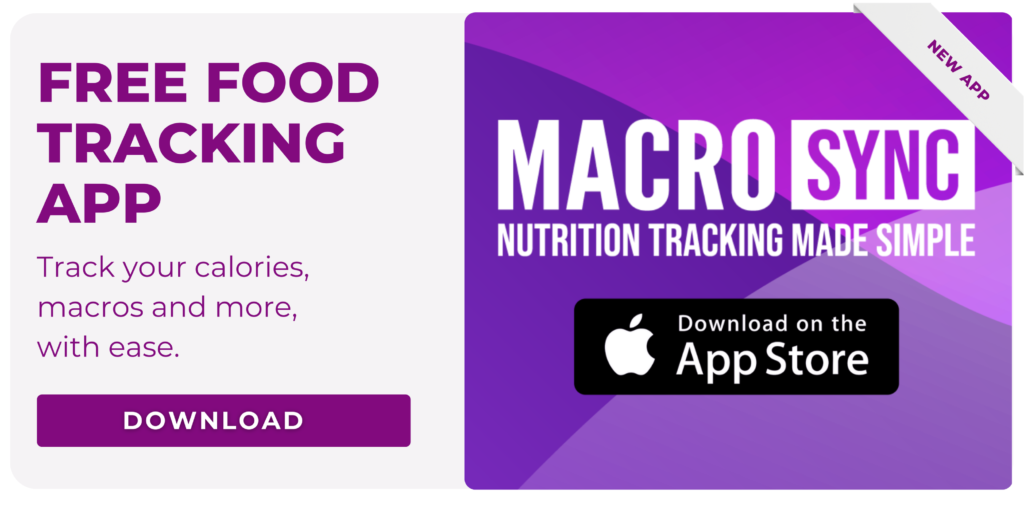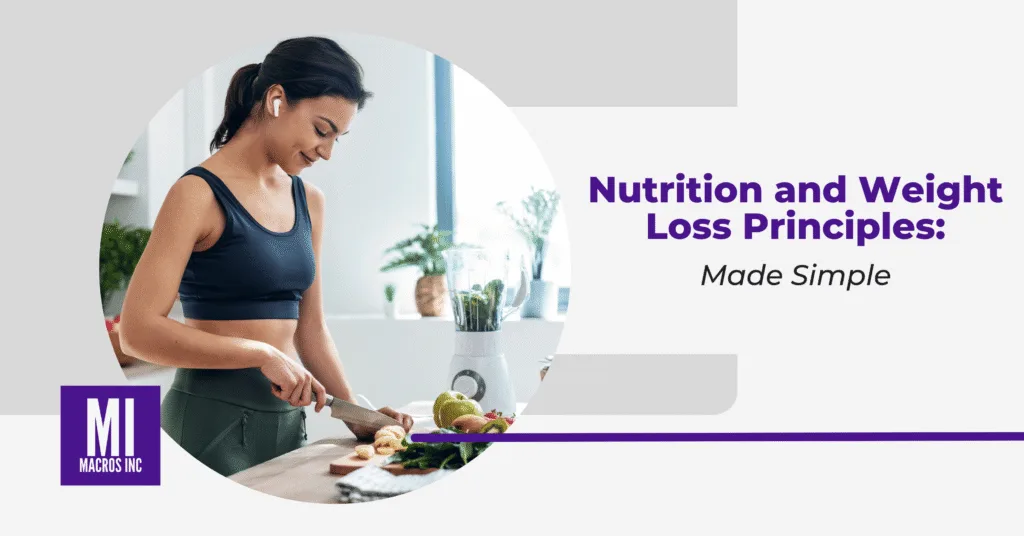Nutrition and weight loss principles don’t need to be mysterious, complicated, or filled with conflicting advice. But if you’ve ever found yourself wondering why some strategies work while others fail—or why results seem temporary—you’re not alone.
Whether you’re brand new to this or have tried a dozen diets before, the truth is this: lasting progress comes from understanding a few key principles and applying them consistently. Not gimmicks. Not extremes. Just fundamentals that actually work.
In this guide, I’m breaking down 13 simple principles that will help you better understand nutrition, energy balance, and how your body really works when it comes to weight loss. Some you may have heard before, but I promise this is the clearest and most practical explanation you’ll find.
Let’s dive in.
Jump to a Topic
Nutrition and Weight Loss Principles Made Simple
Principle 1: Food is Energy and Nutrients
Every food and drink you consume contains two primary components: calories and nutrients.
- Calories are the energy your body needs to function. They keep your heart beating, your lungs working, and your muscles moving.
- Nutrients allow your body to perform essential functions. They help create energy and provide the materials your body needs to build and repair cells.
Principle 2: You Need Enough, But Not Too Much
Your body operates under the laws of physics. It needs energy coming in (food) to balance energy going out (daily activities and metabolism).
- If you take in too much energy, your body stores it as mass (weight). This can be good or bad, depending on your goal.
- If you take in too little energy, your body loses mass (weight). Again, whether this is good or bad depends on your context.
Weight gain and loss come down to finding the right balance of energy intake and expenditure.
Principle 3: The Best Way to Change Your Weight is to Track Your Intake
Outside of a scientific lab, the most effective way to change your weight is to follow these three steps:
- Estimate your daily calorie needs. Our calculator can help with this.
- Track your food intake carefully for 4-6 weeks and monitor your weight trends.
- Adjust as needed. If your weight is moving in the right direction, keep going. If not, adjust your intake up or down slightly and repeat the process.
Not sure where to start? Use our free app, Macro Sync, to easily log your meals, track your macros, and see your progress over time. It’s designed to make tracking simple, accurate, and consistent—so you can focus on the habits that matter.

Principle 4: Energy is the Priority, But Nutrients Matter Too
Food provides both energy (calories) and nutrients. There are two primary types of nutrients:
- Macronutrients provide energy (protein, carbohydrates, and fats). Protein and carbs contain 4 calories per gram, while fat contains 9 calories per gram.
- Micronutrients do not provide energy but are vital for bodily functions. These include vitamins and minerals, and even though they do not provide calories, they are crucial for maintaining health.
Lacking micronutrients can lead to deficiencies and poor overall health.
Principle 5: Energy Out Matters Too
If you eat zero calories, you will lose weight but that is not a smart approach.
Your body burns energy throughout the day. The best long-term weight management strategies involve balancing energy intake with energy output.
Increasing activity helps significantly, and you do not have to hit the gym to do it. Even simple movement, like walking more, can have a big impact.
Principle 6: Exercise is About Adaptation, Not Just Burning Calories
Your hour in the gym might only account for 5-10% of your daily calorie expenditure, so exercise itself is not the biggest driver of weight loss. Instead, think of it like this:
- Exercise burns calories, but more importantly, it signals the body to adapt.
- Lifting weights strengthens bones and muscles.
- Cardio makes the heart more efficient.
- If you want bigger arms, you lift weights. If you want better endurance, you train your cardiovascular system.
Exercise is about building a better body, not just burning calories.
Principle 7: Creating a Caloric Deficit is Simple, Managing Behavior is Hard
Any diet that puts you in a caloric deficit will lead to weight loss, but sustainability is key.
- Pay attention to what you eat, whether through tracking, mindfulness, or journaling.
- Stick to simple foods. Highly processed foods tend to make overeating easier.
- Protein is essential. A higher-protein diet makes sticking to a calorie deficit easier.
- We are inherently bad at estimating. Most people overestimate their calorie burn and underestimate how much they eat.
Principle 8: It Takes Work
There is no “30 pounds in 30 days” shortcut. You need to build skills, change behaviors, and solve problems. But it works, and it will be worth it in the long run.
Principle 9: There is a Limit to Learning, Action is More Important
You do not need a Ph.D. in nutrition to succeed. Once you understand the basics, taking action matters far more than consuming endless information.
Principle 10: The Macro Basics
1. Protein
Protein is not just for muscle building, it is critical for weight loss too. It helps retain muscle while losing fat and is the most filling macronutrient.
- Aim for 0.7-1.0 grams per pound of body weight per day.
- Spread protein intake throughout the day, but do not stress about hitting exact numbers in every meal.
- The “30g per meal” protein myth is false. Your body will use what it needs.
2. Carbohydrates
Carbs are neither inherently good nor bad. They do not directly cause weight gain, total calorie intake does.
- Fiber is a type of carb that helps with satiety. Eat 5+ servings of fibrous vegetables and fruits per day.
- Reduce added sugars when possible, but you do not need to eliminate them.
- Fructose is fine unless consumed in massive amounts (over 100g per day).
3. Fats
Fats are essential for health and hormone production, but higher-fat diets do not inherently lead to better fat loss. Once protein needs are met, your remaining calories can be from either fat or carbs, it is mostly personal preference.
Principle 11: Artificial Sweeteners, The Truth
Despite controversy, artificial sweeteners do not cause weight gain and are generally safe. Some people experience GI issues or headaches from certain sweeteners, so if that is you, avoid them.
Principle 12: Alcohol in Moderation is Fine, But It is Not Helping
Alcohol contains empty calories and impairs decision-making, often leading to overeating.
- Track alcohol in your calories.
- Avoid overcomplicated, high-calorie drinks.
- Be mindful of how alcohol influences your food choices.
Principle 13: Play the Long Game
You cannot undo years of habits in a month. Long-term consistency is key.
- There is no finish line.
- Prioritize sustainable habits.
- Avoid crash diets and quick fixes.
Final Thoughts
If you take nothing else from this, remember:
- Calories matter most.
- Nutrients are essential.
- Exercise is about adaptation.
- Long-term consistency wins.
Now, go put this into action.
Try our nutrition coaching, for free!
Be the next success story. Over 30,000 have trusted Macros Inc to transform their health.
Simply fill out the form below to start your 14-day risk-free journey. Let's achieve your goals together!

